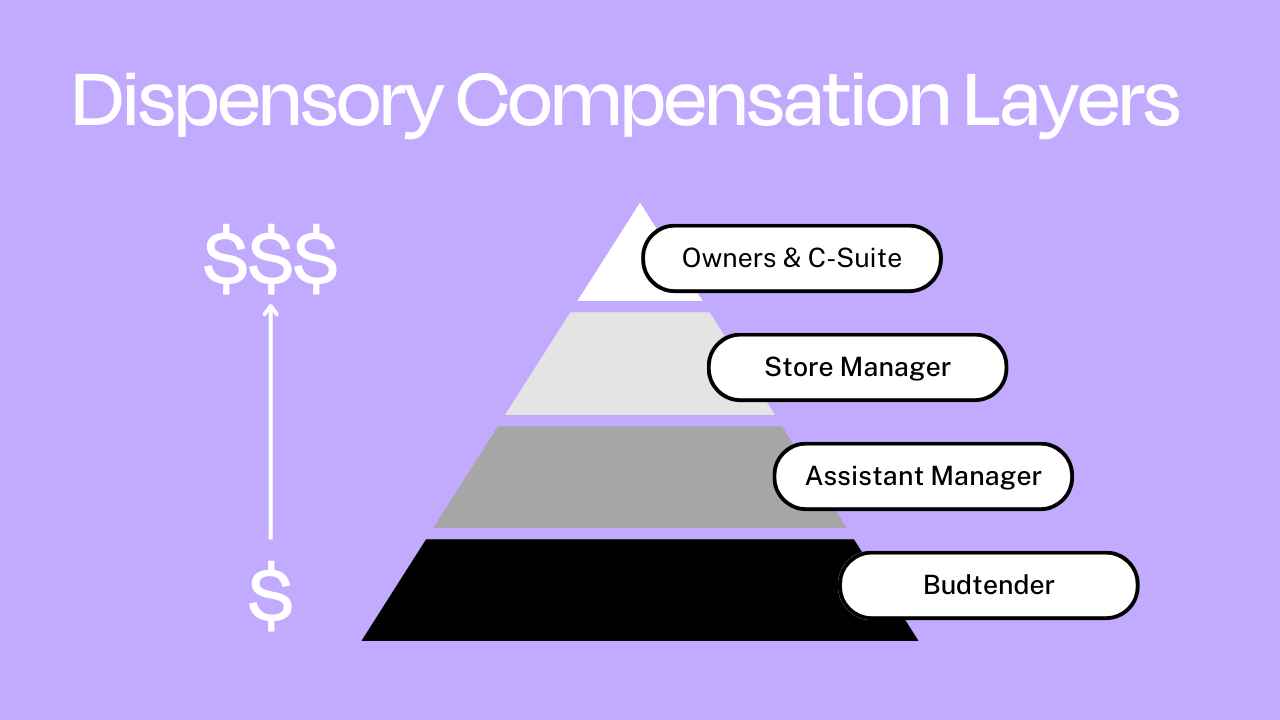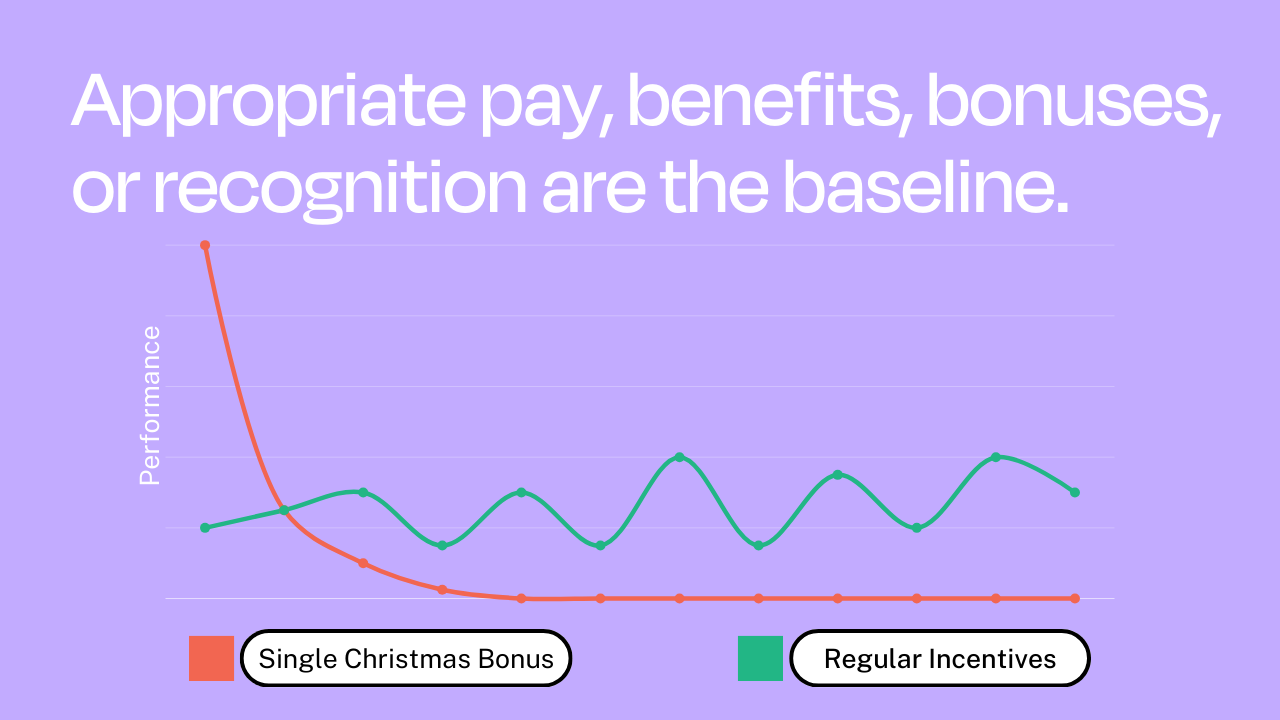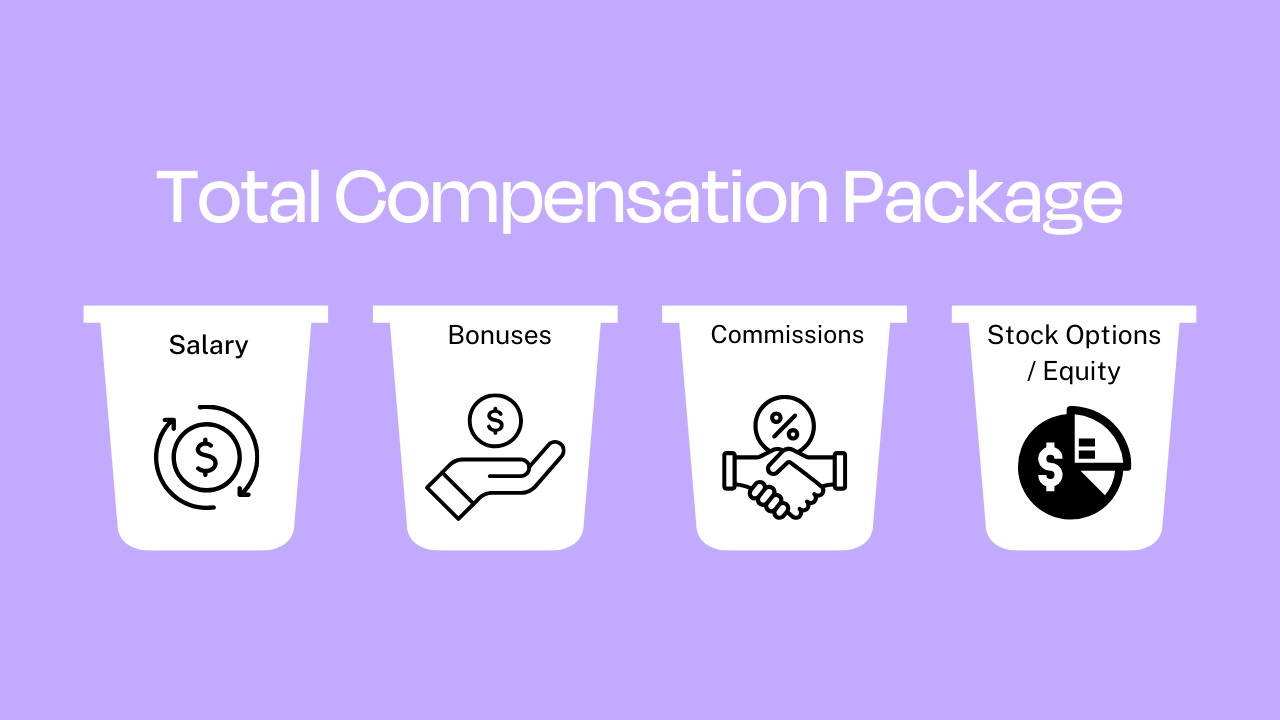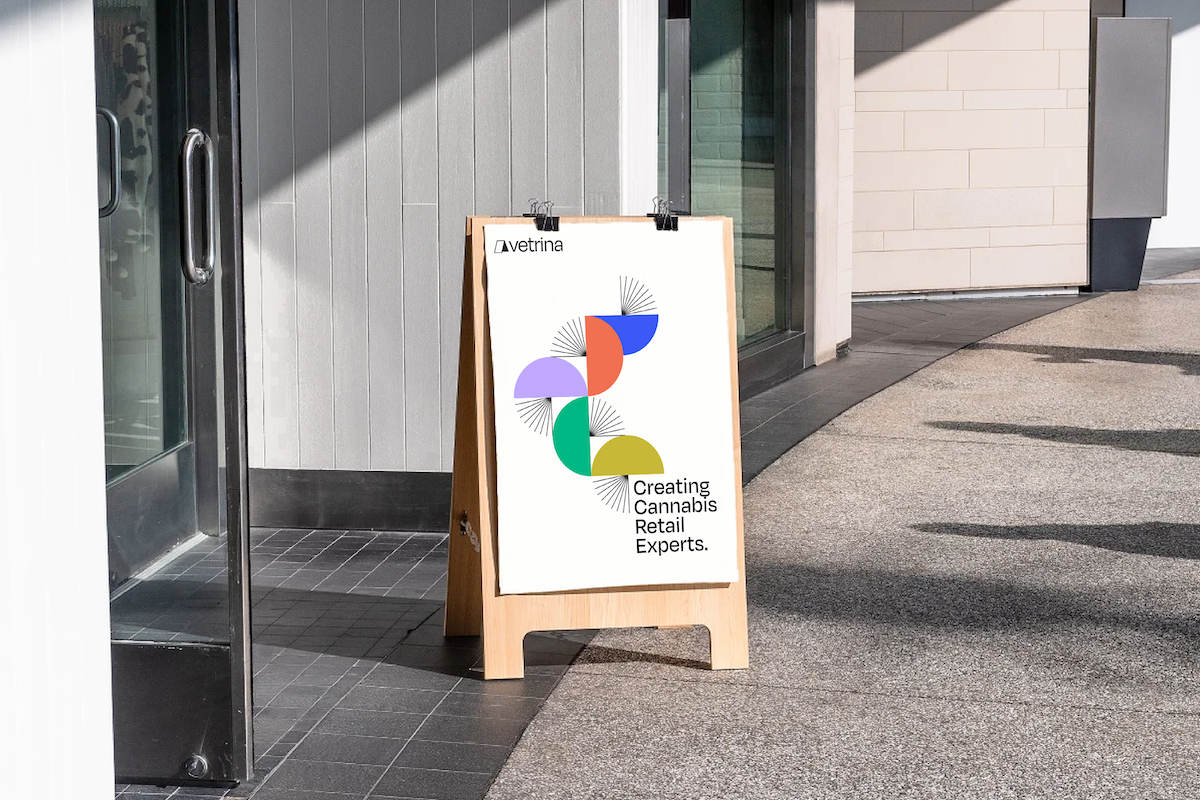Cannabis retail management teams are more likely to be underpaid and underappreciated than in other industries.
Budtenders typically receive tips and only higher-level store managers qualify for bonus programs, leaving Assistant Managers (ASMs), Supervisors, and Keyholders somewhere in the middle.
These key team members have many responsibilities, including operational duties that pull them away from the POS, reducing their ability to earn tips. Since they are often hourly employees—not salaried, full-time managers—they don’t qualify for traditional bonus programs.
This is a problem, and it’s causing strain within many dispensaries.
In this article, we’ll dive deeper into the root of the dispensary compensation issue, and then share ways to build a bonus and compensation structure that appeals to employees and encourages retention.
The root of the compensation issue
Dispensary staff can be tiered into five general layers:
- Customer service staff
- Assistant managers/supervisors
- Store managers/department leads
- Regional leads
- Owners/C-suite
How many employees you have, and the depth of these layers, depend greatly on the organization's size and org chart. Obviously, single-store operators will have a simplified version of this, while MSOs may have even more layers.
But generally, there is a hierarchy within operations, and each level has different ways of handling compensation.
Customer service (or customer-facing) roles include budtenders, receptionists, and greeters. These employees will generally recieve an hourly rate + tips. Their income depends on how much they work, and how they engage with customers.
Assistant managers, shift supervisors, or keyholders are on the floor and responsible for customer experience and operational responsibilities. However, they’re generally still paid hourly with no benefits.
Store managers, department leads, and regional leads are usually salaried employees, with access to benefits and other performance-based compensation opportunities, like bonuses.
Owners and the C-suite are also generally salaried employees, with access to benefits, including company performance-based payouts, such as stock options and equity.

In the first two categories, compensation arrangements are on par with other industries, like retail and hospitality.
Despite being considered leaders and coaches who encourage customer engagement and drive sales initiatives, keyholders and assistant managers sometimes earn lower total compensation than other dispensary staff.
Why? They support operational tasks, which takes them away from the sales floor and POS, reducing their chances of getting tips (if eligible).
The impact of qualified employees
Despite what may appear to be an abundance of Assistant Managers, the problem is that there is a limited supply of qualified ASMs and Keyholders in the industry. They can be underpaid and undervalued even though their roles are incredibly important.
The root cause of this problem is that ASMs and Keyholders are often underequipped, under-trained, and under-invested in. A retail operator can’t expect someone who has only worked as a budtender for six months to be a great Assistant Manager or even Keyholders. They both require proper training and investment to effectively understand their role and perform to the standard.
Rewards and compensation impact behavior
All of this impacts the behavior and outcomes of your front-line staff.
Motivation is key here. Proper incentives drive individuals towards desired outcomes. Offering rewards, like appropriate pay, benefits, bonuses, or recognition, ignites motivation and activates the brain's reward system.
The timing, type, and perceived value of rewards play crucial roles in motivation. Immediate rewards often have a stronger impact than delayed ones because the brain prefers instant gratification. That's why annual incentives in retail often don't work as well.
It also comes down to individual goals and reward styles. Remember that paying staff fairly for their work is the responsibility of every business operator. How those incentive programs work can vary, but ultimately, you also have to weigh the cost of turnover.

The true cost of turnover
In the cannabis retail industry, it's common to see a turnover rate of 55% every year, which is well above overall rates. This poses a real business risk to cannabis businesses.
Managers experiencing burnout—or who feel underpaid or undervalued—can have a powerful impact on store performance. As a keyholder or ASM, working in such an environment can be demotivating. It can lead to stores not opening on time and potential revenue loss.
At the same time, frequent turnover can result in compliance risks, data accuracy issues, and increased costs for onboarding and rehiring.
How to build a bonus structure for all dispensary employees
Extending your bonus structure is one way to reduce turnover, appropriately compensate at all levels, and improve performance across the entire organization.
Money is a strong motivator; tapping into this can make the management team more productive and your store more successful. Here are a few tips to help you craft a new compensation structure.
Customize bonuses for different roles
Not every role needs the same type of compensation plan. They should be unique based on the role’s goals and performance indicators.
To start, clearly outline the roles of each level within your organization. Aligning the bonus structure with role-specific measurements is the secret sauce. Keyholders are evaluated based on day-to-day performance indicators, ASMs are measured based on weekly store goals and improvements, and store managers are measured on monthly/quarterly sales goals, payroll, and inventory management.
For budtenders, consider opportunities to incentivize upsell or cross-sell, like sales contests and performance-based spot bonuses.
The goal is to keep everyone motivated and focused on the store's overall success. Tailoring the compensation structure to meet the unique requirements of each role ensures that management teams are motivated and aligned with how they impact retail success.
Set difficult yet attainable benchmarks.
Setting benchmarks for sales incentive programs is a delicate task. On one hand, the targets should be challenging enough to inspire hard work, dedication, and continuous improvement. On the other hand, they must be realistic and attainable to avoid demotivating the sales team.
To strike the right balance, consider the following strategies:
Data-driven goal setting - Use historical sales data and performance metrics to establish benchmarks that are ambitious yet grounded in the team's capabilities. This ensures the targets are based on a realistic understanding of the market and the sales team's potential.
Tiered incentive structures - Implement a tiered system where multiple levels of achievement are rewarded. This allows sales representatives to experience success at various stages, keeping them motivated throughout the incentive period. Each tier should pose a progressively greater challenge, encouraging continuous effort.
Beyond finding the balance in setting these goals, you need to develop a way for staff to track their progress. It should never be a surprise. And finally, you need to ensure you’re paying out these bonuses as expected, otherwise, you risk impacting your staff's morale and trust with management.
Consider the overall compensation package
When it comes to motivating employees to perform better, financial incentives can be an effective way to go. Cash is a popular reward for top performers, but you can offer a few different types of incentives, depending on your company's goals, financial standing, and budget.
Bonuses - One option is to offer bonuses to team members who hit their quotas. These bonuses could be a set amount of money or a percentage of the sales they bring in. Often paid out monthly or quarterly, bonuses can be a great way to reward employees for their hard work and encourage them to continue performing well. But a benefit is they are performance-based, and must be earned, which supports your bottom line, while also driving employee motivation.
Commissions - Giving your team a percentage of the sales they make can be a surefire way to increase sales numbers. This can be especially effective if you have a sales team that is highly motivated by financial rewards.
Salary increases - If you're looking to reward employees on a more ongoing basis, you might consider offering salary raises to those who perform well at the end of sales cycles. This can help to incentivize employees to consistently perform at a high level. And many employees like salary increases because it’s guaranteed income.
Stock options/equity - Finally, offering employee stock options can be a way to make team members feel personally invested in seeing the company succeed. However, it's important to note that this should not be given in place of a base salary, as it may not provide enough financial security for employees.

Total compensation packages often include a combination of short-term and guaranteed (like their base pay), plus company-paid benefits, mid-term performance-based payouts (like bonuses or commissions), and long-term, riskier options, like stock. The key is to find the right combination of these components to motivate and retain your best employees.
Final thoughts
Revitalizing compensation in cannabis retail is not just a financial strategy; it's an investment in your team's success. By understanding the unique contributions of each role and tailoring bonuses accordingly, we pave the way for a motivated, engaged, and high-performing team.
But with that comes competitive and motivating incentives, including for lower and mid-level staff and supervisors. By following these tips, you can build bonus structures that ensure the success of your business, and your staff.

Looking for more tactical insights like these?
Sign up today for Vetrina’s Cannabis Retail Insider newsletter.
Get strategies for cannabis retail profitability & growth, plus tips, resources, and insights—delivered straight to your inbox.




